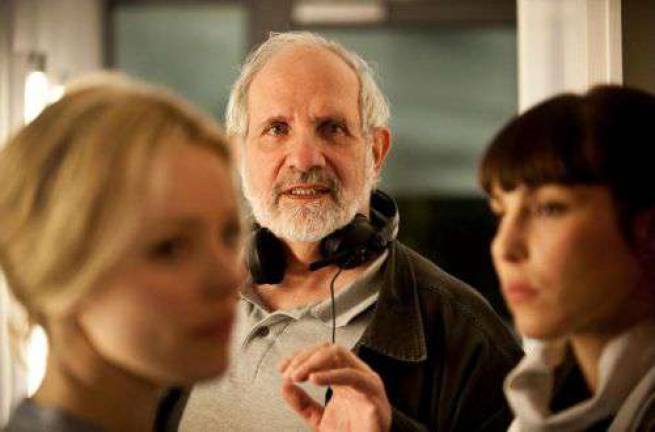Trash, Rehash and Innovation

Late DePalma, Early Fassbinder in new releases
After decades of inspired, always modern, genre-revising work, Brian DePalma finally goes derivative in Passion. His remake of Alain Corneau's 2010 Crime d'amore isn't up to the level of that well-cast but trashy film. DePalma merely rehashes its plot--moving the story from Paris to Berlin where a diabolical, sex-obsessed American ad executive, Christine (Rachel McAdams) steals ideas from her also sex-obsessed Eurotrash assistant Isabelle (Noomi Rapace); their secret bisexual involvement with the same man and a woman leads to a murder and a "surprise" ending.
Apparently nothing in this old-hat story of corporate skullduggery and female betrayal stimulated DePalma creatively as Hitchcock, Lang, Welles and Godard used to--so he also rehashes himself: Passion offers familiar DePalma tropes from multiple point-of-view imagery, T and A shots to an aggressive/seductive Pino Donaggio music score, even a split-screen sequence. Strangely, there's no teasing slo-mo; a lack that suggests tepid enthusiasm.
Two sequences prove DePalma is uninspired: a nearly two-minute dead-air close-up of Isabelle sitting in her parked car recalling a voice-over conversation and a speech in which Christine discusses her twin sister. The latter automatically brings to mind DePalma's first compelling narrative, Sisters (1973); it may also be a sly tribute to Rainer Werner Fassbinder's cinephilia in The American Soldier when a memorable forlorn monologue by Margarethe von Trotta recited the plot of Fear Eats the Soul: Ali. Such modernist, self-referential play is not new for DePalma but Passion lacks Fassbinder's Germanic atmosphere which was vital to the narrative experiments of his early films. (Five of these historic works are part of Criterion's worthwhile new Eclipse DVD box-set "Early Fassbinder.")
Passion doesn't emerge from its setting as in great DePalma films (the socially specific Hi, Mom!, Sisters, The Fury, Dressed to Kill, Blow-Out, Scarface, Femme Fatale or the purely dreamlike Carrie, Casualties of War, Mission to Mars). The scheming pansexual Christine and Isabelle belong to a treacherous world unconnected to DePalma's Berlin tax-shelter locale and just barely based in his pussyhound imagination. The story's lesbian flirtation stays on the same unsurprising, ogling level: Christine rewards Isabella with a trip to a girly fashion show then seduces her with a pair of red Fuck-Me pumps as a gift.
In an ambiguous blue-toned, probable dream sequence, Christine heartlessly mocks the "dyke brain" of Isabelle's loyal assistant, Dana (Karoline Herfurth, a Jessica Harper type). Passion itself mocks dyke passion by not rooting it in the urban Berlin locale like the social, sexual and psychological daring of the Fassbinder Eclipse package. Even in a mixed-genre meller like The American Soldier you can feel Fassbinder making the given tropes his own. Unfortunately for DePalma, this soft-core lesbiana forces comparison to more overt transgressive dramas such as Paul Verhoeven's Basic Instinct and Olivier Assayas' Demonlover. Imagine how DePalma at one time could hilariously revise those thrillers. Instead, Passion seems entirely desultory: The "ass-cam" commercial Isabelle invents, followed by a series of multiple digital-age cell phone p.o.v.'s, seems juvenile rather than a satirical invasion of individuals' spaces and private imaginings.
In Passion, DePalma neglects his previously insightful, satirical p.o.v. The disastrous split-screen sequence juxtaposes simultaneous events (a ballet and a party) that are emotionally unrelated. It could have been executed by a neophyte second-unit director posing as the young master of Sisters, Carrie and The Fury. (The cinematographer is Jose Luis Alcaine who shot Almodovar's visionary The Skin I Live In, a DePalma-influenced achievement that must have defeated the old master.) Other replayed DePalma effects include his protagonists: McAdams' naughty-girl act lacks authenticity--and Nancy Allen's insouciance. Mannish Rapace's high-cheekbones, Kim Novak-jawline and faraway eyes suggests moral ambiguity but turns tiresome and repugnant.
This blatant retread indicates moral indifference proven by DePalma's silky banalities. Revisiting early Fassbinder reveals a filmmaker responding to genre yet expressing his world (as in capturing the physicality and existential weight of Karl Scheydt's Ballantines-drinking killer in The American Soldier). Passion doesn't excite DePalma's reflexes; he simply responds to contemporary decadence and inhumanity with rote "style" as in a cadaver shot that evokes the ugly finality of Casualties of War and Redacted. Failing to deconstruct or satirize Corneau's claptrap, DePalma's own style seems hackneyed. Fassbinder's anguished self-discovery remains thrilling but the thrill has gone out of DePalma's filmmaking--and so has the passion.
Follow Armond White on Twitter at 3xchair